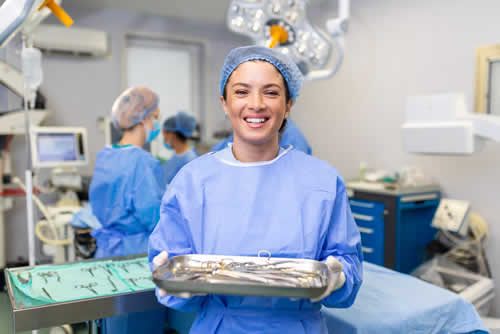The role of Surgical Technician is one that brings big rewards and huge responsibilities in equal measure. Because of this, it’s essential that you start off with the right foundation by finding the best Surgical Tech training program. In developed countries, there are more opportunities in healthcare nowadays than ever before - and skilled medical professionals are very much in demand.
Within an operating room, the Surgical Tech is often the unsung hero - but a hero nonetheless. This important role lends vital support to surgeons and medical teams to ensure that procedures are carried out safely and efficiently.

Making sure that you receive the best possible training is key to achieving your career goals in the field but with so many options available, it’s often difficult to know where to start.
The best
surgical tech program will arm you with the skills, hands-on experience, and proper credentials needed to succeed in this competitive field and so, in this article, we’ll share our tips for finding the best program to suit your needs so you're sure of future success.
Understanding the Role of Surgical Technologist
Before we begin, it’s important to figure out if the role of Surgical Technician is right for you - and this involves gaining an understanding of what the job entails. In this section, we’ll explore the job description of a Surgical Tech - and what it takes to become one.
A Surgical Technician, also
known under many names, including Surg Tech, Scrub Technician and more, is responsible for preparing the operating room, equipment and patients for surgery. This includes:
- Sterilizing tools and equipment
- Ensuring that all necessary tools and equipment are in situ ahead of the surgery
- Safely transporting patients to the operating room
- Assisting the surgeon by passing tools and maintaining a sterile environment
- Meticulously counting supplies to ensure that nothing is inadvertently left inside the patient
- Disinfecting and sterilizing the surgical site and surrounding skin to prevent infection

So, far from being just an assistant role, the Surgical Tech is the backbone of any surgical team and a much valued member of the operating room.
A cut above
Needless to say, such a focal and often intense job is not for everyone and, to have a shot at this rewarding career, you’ll need to be able to tick a number of boxes. These include a comprehensive knowledge of anatomy, surgical equipment and medical jargon. You’ll also need to be able to juggle speed and precision while maintaining a cool head at all times - even when things go wrong.
If you’re thinking that’s a lot of responsibility, you’d be right - which is why finding the right training program is of paramount importance to help you to hit the ground running in your new career.
Research Accredited Programs
We all know that training programs can vary widely and that some do not come with a legitimate accreditation. While this may be fine for a career in marketing -- or decorating -- these courses don’t cut the mustard when it comes to healthcare.
Hospitals, clinics and other medical facilities are required to meet some incredibly high standards, including their employees. This means that most facilities will only accept Surgical Technician candidates who hold an accredited qualification which proves that they have completed comprehensive training.
The sharp end of accreditation
When searching for a Surgical Tech program, your best bet is to whittle your shortlist down to only those that are backed by a
recognized accrediting body such as:
- The Commission on Accreditation of Allied Health Education Programs (CAAHEP)
- The Accrediting Bureau of Health Education Schools (ABHES)
- The National Board of Surgical Technology and Surgical Assisting (NBSTSA)

Choosing a program which is backed by one of these recognized bodies is essential for allowing you to gain CST certification. These options will also ensure that you’re getting the best possible training through monitoring of teachers, curriculum and training modules.
Location, location, location
When it comes to studying and working in surgical technology, where you live really matters. To begin with, you need to figure out how many job opportunities exist in your current location as, if these are sparse, you may want to consider relocating to give you more options.
Secondly, even if you’re opting for a remote or hybrid form of learning, there’s a good chance that you will still need to clock up some on-site clinical hours during your training. This means that you’ll need to do your research to find your nearest facilities and then figure out how you might get there. A long and complicated commute can get old really quickly and so location really matters.
Before signing on the dotted line, always make sure that your choice of program aligns with your location and the ease of access to potential employers.

If you'd like to learn more about what we provide, why not take a look at how we can help?
Boost your skills with our market-leading online courses at super-low prices.
Access all areas
If you have a disability, it’s important that you research your chosen programs really carefully to ensure that your needs will be met. If you can’t find the necessary information online, don’t be afraid to contact the facility directly to ask about any access requirements that you may have.
The long and the short of it
While getting the best, accredited training is incredibly important, not every candidate is able to commit to attending classes Monday to Friday, 9 to 5. Over-committing yourself is a sure fire way to fail before you’ve even begun.
The two main routes into a career as a Surgical Technician are (a) a Certificate Program which has an intense focus on the essentials and will take between 9 and 12 months and (b) an Associate Degree which will take around two years and will offer more in-depth and broader training.

While these courses are usually available as full-time, classroom based training, some facilities will offer night, weekend, online or hybrid courses. These can be really helpful for those who need to work their learning around childcare or other existing responsibilities.
Don’t bypass clinical training opportunities
For many people, real, comprehensive learning is achieved through hands-on experience - and this is where clinical training comes in. Learning from a book or a website can be a little one-dimensional and doesn’t allow you to experience the job in a boots on the ground way. Clinical training rotations allow you to combine your theory training with on the job experience in a real healthcare setting. By working with surgeons and nurses in an actual operating room, you can not only practice what you’ve learned and build up your confidence but also get a more informed idea of whether this intense and sometimes chaotic world is right for you.
Because of this, we highly recommend that you find a program which offers such valuable practical experience. When perusing curricula, dig deeper to find out if they partner with any medical facilities and, if so, whether or not you will be given the opportunity to take part in clinical training. Variety is the spice of life; even in medical training so the more opportunities a program offers, the more committed they are to training the next generation of Surgical Techs. It's also worth checking out internships and externships as these can really give you a recruitment edge after you graduate.
Counting the cost and financial aid options
As important as the right training program is, cost is often a sticking point for many students. While a certificate course will usually tend to be cheaper than an Associate Degree there are costs involved for both - and these can vary widely depending on where you look and where you live. As well as tuition fees, you’ll also be responsible for other expenses including:
- Textbooks and materials
- Scrubs
- Laboratory fees
- Clinical spots
- CST exams (usually a few hundred dollars)
Don’t panic just yet though, because there's help out there for aspiring Surgical Technicians.

Before you commit to a program, have a look to see what might be available to you. It’s possible that you may be eligible for a scholarship, grant or loan through government funding. Similarly, some programs offer their own awards or work-study deals and partner with a third party funding organization. Take the time to do your sums and figure out what you can afford and then research any financial aid that will allow you to lighten the impact on your pocket.
Program vital signs - reputation and success rates
So, you’ve done a deep dive into a program’s accreditation - but does it get real-life results ? A program might talk a good job but if that doesn’t directly translate to paid employment it’s of little use. Always research the reputation and track record of a program by checking out what past students have said. You’ll also want to look for - or ask for - evidence that a program has connections to healthcare employers who actively seek out its graduates.
While you’re at it, look at the numbers -
- What’s the program’s graduation rate?
- What are the program’s CST exam pass rates?
- How quickly do the program’s graduates land jobs after graduation
Before you commit your time - and your hard-earned cash to a program, you really need to double down on your research to avoid any nasty surprises further down the line.
Think about your long-term career goals
When it comes to choosing a training program, your career goals should always be front and center. Have a think about what you want to achieve - both long and short term - in your career as this can inform your choice of program. For example; you may want to eventually specialize in cardiothoracic or orthopedic surgery and so picking a flexible program that will allow you to tack on certifications and specialties - and that offers job placement will help you climb the ladder more quickly for an extremely rewarding and lucrative career.
Sewing it up
Setting your sights on a career as a Surgical Technician requires focus and commitment - as does finding the right training program. Choosing the right course may be the difference between success and failure and so this is a decision that should never be taken lightly. In order to find the right fit, remember your checklist:
- Review your career goals
- Consider the location of your training
- Weigh up the cost of your training and look for financial assistance
- Check for accreditation
- Research hands-on-training opportunities
- Read testimonials and reviews
By keeping these things in mind, you can’t go far wrong and, before you know it, you’ll be starting your journey from classroom to operating theatre ... and the career of a lifetime!






























